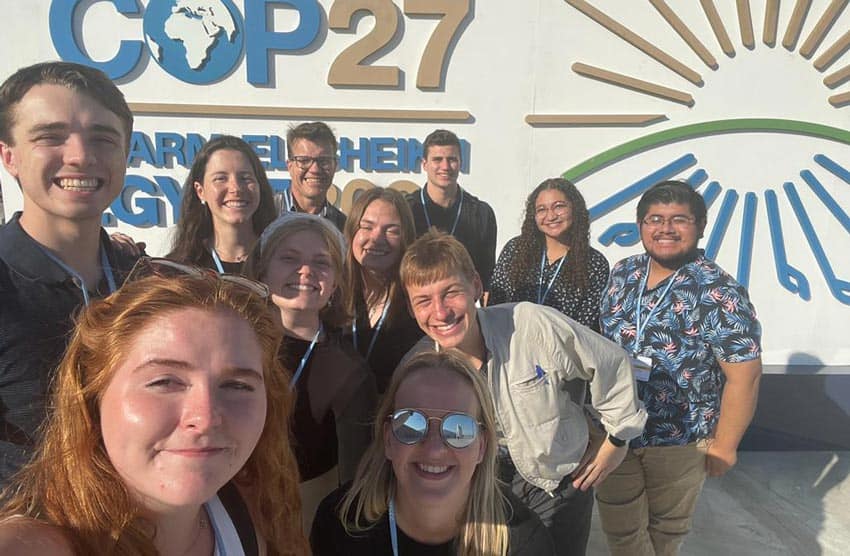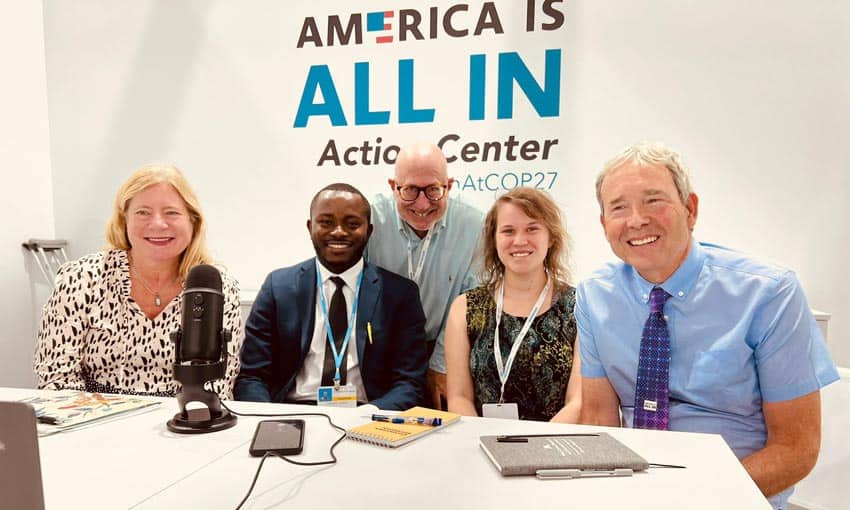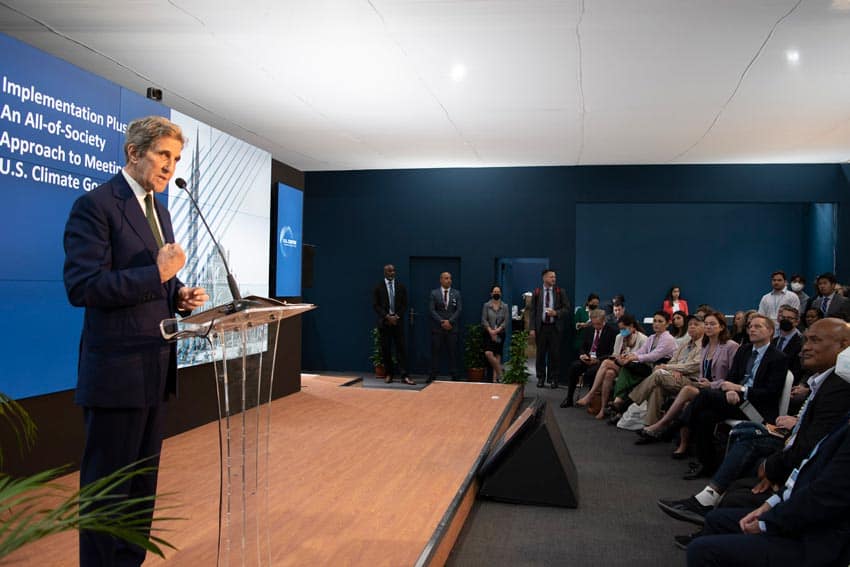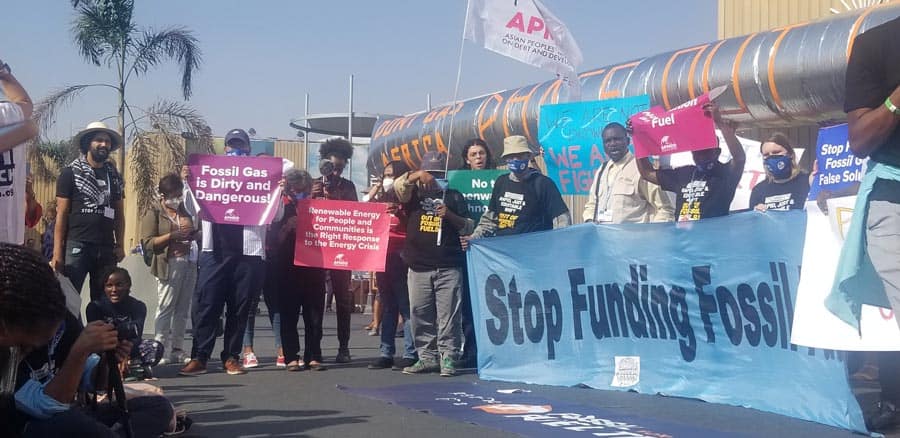Students interested in studying global climate change – and finding solutions to it – have an advantage at the College of Saint Benedict and Saint John’s University that is unavailable to many of their peers across the country and the world.
In 2009, Bennies and Johnnies first traveled to Copenhagen to participate in the United Nations Framework Convention on Climate Change (UNFCCC) annual Conference of the Parties (COP). The COP originated in 1995 in Berlin and subsequently has been held in varying cities on every continent except Antarctica and Australia. In 2015 (COP21 in Paris), CSB and SJU were granted formal observer status for the event, which has enabled annual student participation in large numbers every year except for 2020 and 2021 because of COVID-19.
The UNFCCC had almost 200 parties this year, including every member of the United Nations, UN General Assembly observers and non-member states. Among hundreds of non-governmental organizations that attended from the five-state Upper Midwest region in the U.S., only two other higher education institutions have sought and received observer status. Those include Macalester College and the University of Minnesota, with the latter only allowing graduate students to attend the conference.
From CSB and SJU, 20 students and two faculty members ventured in weeklong cohorts to Sharm el-Sheikh, Egypt, for COP27, which ran from Nov. 6-20. And that’s how Kate Fenske, a senior integrative science major from Shoreview, Minnesota, wound up less than five feet away from U.S. Special Presidential Envoy for Climate John Kerry – multiple times no less – at the annual summit for environmentalists and lobbyists.
“It was really overwhelming,” said Fenske, who serves as managing editor for The Record (CSB and SJU’s student newspaper) and wound up quoted in the New York Times – something she said was the “coolest thing in the world to me.”
Fenske and nine others, under the leadership of political science professor Matt Lindstrom, were at the COP during its first week, when President Joe Biden addressed the convention.
“It’s very high-security and high-profile,” Fenske said. “But what’s most valuable to me is that you meet all these people who are doing so much in their home communities, and there are thousands of them. I’ve never been to the Olympics, but it felt what I would imagine that atmosphere would be like.”

The first group of CSB and SJU students to attend COP27, along with faculty member Matt Lindstrom, were in Egypt during the first week of the event. It ran from Nov. 6-20.
Preparation through environmental studies classes
To earn a credential, students from all majors may apply each spring and participate in interviews to determine who goes. Then they take a two-credit class (ENVR 305: global climate policy) and some add a two-credit workshop (ENVR 303: climate action). Participants cover their flight and ground transportation, which can total $2,000 – but for which some generous scholarship is available. They are required to develop research projects, conduct interviews with other participants, compile their information and present their findings back on campus and also somewhere in a public setting while they are on winter break.
Their badges allow them to enter the inner zone at the COP, where heads of state appear. They basically had access to everything except closed-door negotiations. In addition to the conference, they also had nightly dinners off-site to experience local cuisine, were able to go to the beach and some found Egyptian culture in twos and threes as their flight arrangements were independent of the group.
Jervon Sands, a senior applied physics major, said he first heard about the conference last year, when he studied abroad in London. He worked for a climate change charity there, and his first day involved an event in England that was a precursor to COP26 in Glasgow, Scotland. That lit a desire for him to attend, and he was delighted to learn about CSB and SJU’s course and opportunity when he returned to campus.
“My interest comes from my background growing up and witnessing the impacts of climate change in a small undeveloped state,” said Sands, who is from Nassau in the Bahamas and wants to go into civil or environmental engineering. “I’ve learned little bits and pieces as I came along in my home country and that made me want to learn more and be part of a solution. In the Bahamas, a lot of climate change can be summed up in hurricanes. There’s an annual season and, in the course of my life, I’ve seen the intensity of these skyrocket. There are also challenges with coral reefs and marine ecosystems that are impacted. We’re seeing less of them. And coastal erosion has been an issue. I’ve seen the government take a development path toward building up sea walls to try to compensate.”
His research centers on infrastructure development and community-based solutions from the diverse perspectives of indigenous people and women.
“A lot of focus globally is on mitigation,” Sands said of efforts to combat climate change. “But that’s a challenge for places like the Bahamas because we’re not emitting as much carbon as other places in the world. When you aren’t emitting a lot, mitigation isn’t as much a priority. But we are experiencing the impacts. So, our biggest priority is adaptation. And because the global focus is on mitigation, we have difficulty getting finances for those adaptation strategies.”
He traveled with nine other students and environmental studies professor Troy Knight during the second week of COP27. Sands found the official UNFCCC events relied heavily on technical research, while side events such as at tents for the Caribbean countries gave him the chance to talk to real people.
“I met so many youth activists and I have so many contacts that I need to reach out to now,” Sands said. “What I found is that even on the global stage it felt easy to integrate because there were so many like-minded people. It was very comfortable.”

Saint Ben’s student Betsy Ruckman (second from right) participates in a panel discussion sponsored by Minnesota-based Fresh Energy at COP27. The discussion was titled “Minnesota’s Role in Speeding Decarbonization of the US Midwest.” Other participants include J. Drake Hamilton (Fresh Energy), Dr. Nfamara Dampha (University of Minnesota), Patrick Hamilton (Science Museum of MN) and a bonus special guest, Minnesota House Rep. Frank David Hornstein.
Urgency made clear by international leaders, grassroots protestors
Betsy Ruckman has participated in the COP twice, although the first time was a simulated experience when she was a sophomore during COVID. She was much more engaged on the ground in Egypt, where she got to listen to Brazilian president-elect Lula da Silva speak surrounded by a crowd of overjoyed Brazilian indigenous attendees.
“I came to Saint Ben’s as a pre-med student because I wanted to help people, heal people and do good,” said Ruckman, a senior from Monticello, Illinois. “But the things I learned in environmental studies told me that there are often bigger problems at work, and a lot of them are environmental. I thought I’d like to be a doctor working in an area prone to lung cancer. I found that what I really want to do is address the coal plant next door that is making people sick. These are complex problems that often rely on political, social and economic challenges.”
The focus of her research is the intersection of scientific knowledge and indigenous wisdom. While she’s long been interested in climate change, that’s been heightened in part by a book “Braiding Sweetgrass” by Robin Wall Kimmerer, and a recent campus visit by environmentalist Winona LaDuke.
“I’m seeing a huge groundswell of interest in traditional ecological knowledge,” Ruckman said. “Based on the conversations I had at the COP, I find it’s silly to divide the world into scientific knowledge and indigenous knowledge. If you’re from the arctic circle, you know all about sea ice. If you’re from Amazonian rain forest you can tell bird calls or different fungus and moss that grows there. These are all important and knowledge looks different everywhere.”
She plans to produce a three-part podcast and, like the other students who made the trip, will publish her work in The Optimist, a solutions journalism website founded by former St. Cloud Times reporter Nora Hertel. Ruckman interviewed participants from almost every continent at COP27 and was perhaps most struck by Ursala Rakova, a woman who lives in the Cataret Islands in the Pacific where she says her home will be underwater by 2050. As one of more than 40,000 people who attended the COP, almost all of whom flew there and often traveled in taxis or vans powered by fossil fuels, Ruckman couldn’t help but feel the irony.
“Every single drop of water I had in Egypt was carried in from somewhere else,” Ruckman said. “As someone who values my own personal sustainability and also hates the taste of plastic water bottles, that was tough … and I saw a lot of examples of what I would call greenwashing, which is making you feel good about something when it really isn’t all that helpful. Like putting ‘Please recycle me’ on bottles that aren’t recycled.”

U.S. Special Presidential Envoy for Climate John Kerry addresses a crowd at COP27. Saint Ben’s student Kate Fenske ’23 took this photo from just a few feet away as Kerry made his remarks.
With optimism and pessimism, participants find community
Knight has participated in three COPs, in 2017 in Bonn, Germany, in 2019 in Madrid, Spain, and this year in Sharm el-Sheikh. COP27 differed in that travel was more arduous – flying Minneapolis to New York to Cairo and then on to the final destination, a resort community that he said had a Las Vegas feel.
“There is some criticism of the environmental impact such a large international conference entails, but there is simply no substitute for the face-to-face interaction the COP provides,” Knight said. “Attendees gain awareness of impacts around the world, share ideas for solutions, and build personal connections that can lead to meaningful cooperation. It is truly special that our students have the opportunity to participate.”
COP27 concluded with a decision to establish and operationalize a loss and damage fund for countries unequipped to cope with the impacts of climate change. But despite 27 such conferences, critics maintain there has been little progress toward actually cutting emissions and severe impacts are almost a certainty now. That leaves participants feeling conflicted.
“If you’re dealing with the climate crisis and you’re not scared and feeling despair, if you’re not frightened, you’re not paying attention,” Ruckman said. “At the COP, there are a lot of opinions that it’s kind of becoming a circus. I read an article that basically said ‘COP27 was fun, but did it do anything?’ It was a photo op for a lot of heads of state. There were two different nuclear power pavilions, and hundreds of fossil fuel lobbyists. That shouldn’t happen at a climate conference. But you can’t not have hope if you’re working on this kind of stuff. You have to have something that gets you up in the morning.”
“I left both encouraged and discouraged,” Sands added. “You’d be at these protests where people are calling for certain action and then you don’t see any of that coming out of the negotiations. And we were there on the last day when they were tearing stuff down. We saw the bones of the structure and it made it seem less tangible and more artificial.”
Fenske plans to either go to law school or get her master’s in public health with an eye toward a career in environmental health or health care advocacy.
“You meet all these young people and the youth activists and organizers and people working to make change in their individual countries,” Fenske said. “They give me hope, and they are the ones I spent the most time with. But then you read articles where we still aren’t making any changes on emissions and that’s what’s causing climate change. Reading things like that doesn’t give me a lot of hope. But the research that comes out of this is amazing and I’ll talk about it for the rest of my career.”
One thing is certain, COP28 is scheduled for November 2023 in Dubai, and Saint Ben’s and Saint John’s plan to be there.
 Many days at COP27 were marked by protests against influences perceived to be causing climate change. Here a group makes clear their opinion of the impact of fossil fuels, and SJU student Sean Fisher ’23 (holding the green sign) participated in Sharm el-Sheikh, Egypt.
Many days at COP27 were marked by protests against influences perceived to be causing climate change. Here a group makes clear their opinion of the impact of fossil fuels, and SJU student Sean Fisher ’23 (holding the green sign) participated in Sharm el-Sheikh, Egypt.

Julia Fine (center) and Tom Hobday ’24 (right) interview a participant at the UN Framework Convention on Climate Change Conference of the Parties 27 in November in Sharm el-Sheikh, Egypt.
